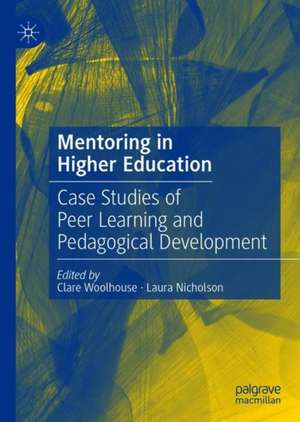Mentoring in Higher Education: Case Studies of Peer Learning and Pedagogical Development
Editat de Clare Woolhouse, Laura Nicholsonen Limba Engleză Hardback – 8 sep 2020
Toate formatele și edițiile
| Toate formatele și edițiile | Preț | Express |
|---|---|---|
| Paperback (1) | 945.65 lei 6-8 săpt. | |
| Springer International Publishing – 9 sep 2021 | 945.65 lei 6-8 săpt. | |
| Hardback (1) | 950.90 lei 6-8 săpt. | |
| Springer International Publishing – 8 sep 2020 | 950.90 lei 6-8 săpt. |
Preț: 950.90 lei
Preț vechi: 1159.64 lei
-18% Nou
Puncte Express: 1426
Preț estimativ în valută:
181.96€ • 188.75$ • 151.73£
181.96€ • 188.75$ • 151.73£
Carte tipărită la comandă
Livrare economică 27 martie-10 aprilie
Preluare comenzi: 021 569.72.76
Specificații
ISBN-13: 9783030468897
ISBN-10: 3030468895
Pagini: 213
Ilustrații: XXVII, 312 p. 7 illus.
Dimensiuni: 148 x 210 mm
Greutate: 0.6 kg
Ediția:1st ed. 2020
Editura: Springer International Publishing
Colecția Palgrave Macmillan
Locul publicării:Cham, Switzerland
ISBN-10: 3030468895
Pagini: 213
Ilustrații: XXVII, 312 p. 7 illus.
Dimensiuni: 148 x 210 mm
Greutate: 0.6 kg
Ediția:1st ed. 2020
Editura: Springer International Publishing
Colecția Palgrave Macmillan
Locul publicării:Cham, Switzerland
Cuprins
Chapter 1. Introduction; Clare Woolhouse and Laura Nicolson.- SECTION I. Mentoring with Undergraduate Students in Higher Education Subsection: Peer Mentoring Between Students.- Chapter 2. De-Mystifying the Concept of Peer Mentoring in Higher Education: Establishing Models for Learning; Emma Ball and Claire Hennessy.- Chapter 3. Student Academic Mentoring: Collaborative Peer Learning and Support for Undergraduates; Gillian Pye, Sue Williams and Linda Dunne.- Chapter 4. Credibility: What Role Does it Play in a Peer Mentoring Relationship?; Janet W. Colvin.- SECTION II. The Mentoring of Higher Education Students by Tutors.- Chapter 5. Developing Positive Personal Tutor Relationships; Annabel Yale.- Chapter 6. Mentoring Students on Professional Courses in Higher Education in the Workplace: New Opportunities and Challenges; Gillian Peiser.- Chapter 7. Peer Mentoring Relationships for Professional Placements; Claire Ball-Smith.- Chapter 8. A Review of Mentorship in Spanish Higher Education: The Case of Writing Tutorials; Sara Rodriguez-Cuadrado and Juan Antonio Núñez Cortés.- Chapter 9. Re-Thinking the Mentoring Relationship: Gabriel Marcel, Availability and Unavailability; Amanda Fulford.- SECTION III. Academic Mentoring in Higher Education Contexts Subsection: Professional Peer and Cross-Cultural Mentoring.- Chapter 10. “The Shoes Should No Longer Fit”: Creating a Space for Caring and Challenge Through the Dissertation Process; Whitney M. Stewart, Terra Greenwell, Sandra L. Hogue, Carla Kent, Dawn Roseberry, Amanda Santos-Colon, and Mary Brydon-Miller.- Chapter 11.Relational Mentoring and the Centrality of Self-Care; Christiane Boehr, Stefani Carlson, Alice Deters, Victoria L. Dickman-Burnett, Allison JoAnn Lester, Brittany Arthur Mellon, Miriam Raider-Roth, Pamela Theurer, and Susan Tyler.- Chapter 12. East Meets West: Exploring the Challenges of Cross-Cultural Mentoring in Pedagogical Development; David Allan, Pham Hoai Anh, and Le Nu Cam Le.- SECTION IV. Mentoring for Social Justice.- Chapter 13. Cinderella Academics: Teacher Educators in the Academy; Vini Lander and Laura Nicholson.- Chapter 14. Practices of Freedom? Seeking the Social Justice Aims of Peer Mentoring Within a Professional Development Programme for Teaching Assistants; Clare Woolhouse and Laura Nicholson.- Chapter 15. Mentoring as a Model of Resistance in Times of Austerity; Vicky Duckworth and Bronwen Maxwell.- Chapter 16. Chapter 16: Conclusion; Clare Woolhouse and Laura Nicholson.
Notă biografică
Clare Woolhouse is Reader at the Faculty of Education at Edge Hill University, UK. Her research adopts a feminist, post-structuralist approach to exploring education for social justice, equality and inclusion, and she has published widely in these areas.
Laura Nicholson is Senior Research Fellow at the Faculty of Education at Edge Hill University, UK. Her research focuses on the psychology of education, particularly facilitators of student engagement and motivation.
Textul de pe ultima copertă
"For anyone working in higher education this book offers great tips and advice on how to use mentoring on a practical level... For educational purposes, this book would be a very useful teaching resource for lecturers in education, but also as guidance to any students studying at undergraduate, postgraduate and doctoral level to understand how they can engage with mentoring to enhance their personal learning journeys."
—Dr Mel Bull, University of Sheffield, UK
"It is refreshing to recognise such a diversity of contexts, practices and approaches to mentoring relationships and the centrality of these to our work as educational professionals... This international collection is critical to understanding how we can all play a role in mentoring to liberate and educate."
—Dr Christine Lewis, Edge Hill University, UK
Clare Woolhouse is Reader at the Faculty of Education at Edge Hill University, UK. Her research adopts a feminist, post-structuralist approach to exploring education for social justice, equality and inclusion, and she has published widely in these areas.
Laura Nicholson is Senior Research Fellow at the Faculty of Education at Edge Hill University, UK. Her research focuses on the psychology of education, particularly facilitators of student engagement and motivation.
Caracteristici
Clarifies and deepens the meaning of mentoring in the context of higher education
Draws perspectives from across the globe and the educational spectrum
Examines the role of mentoring as a form of collaborative learning in higher education
Draws perspectives from across the globe and the educational spectrum
Examines the role of mentoring as a form of collaborative learning in higher education
